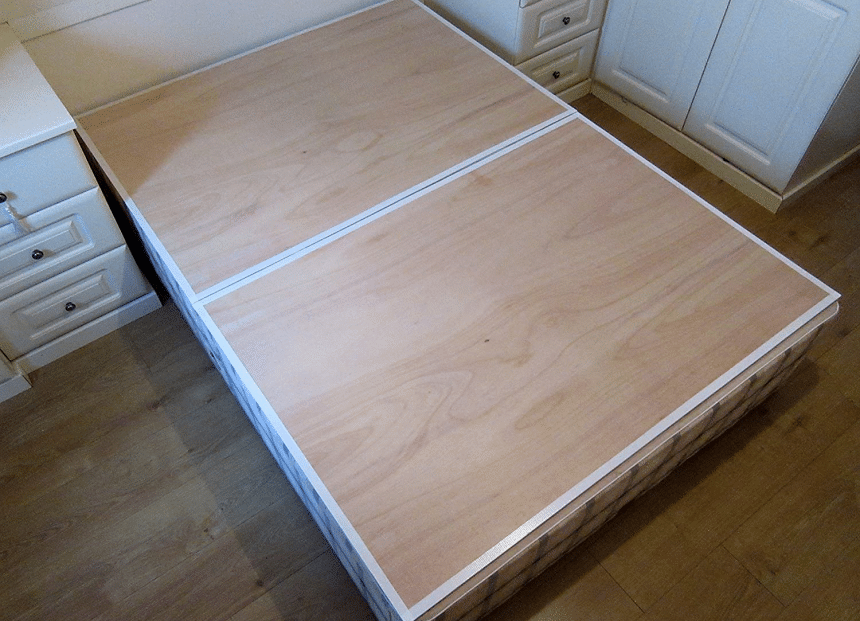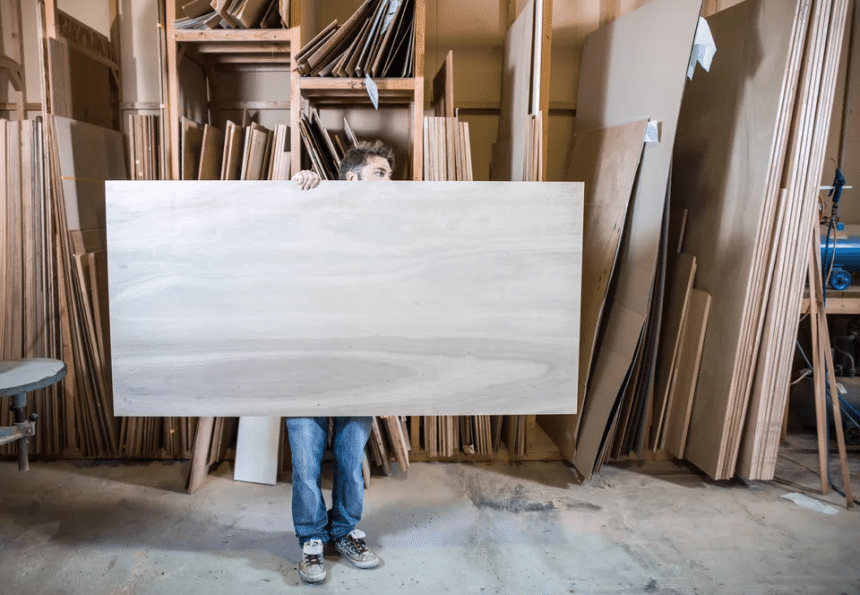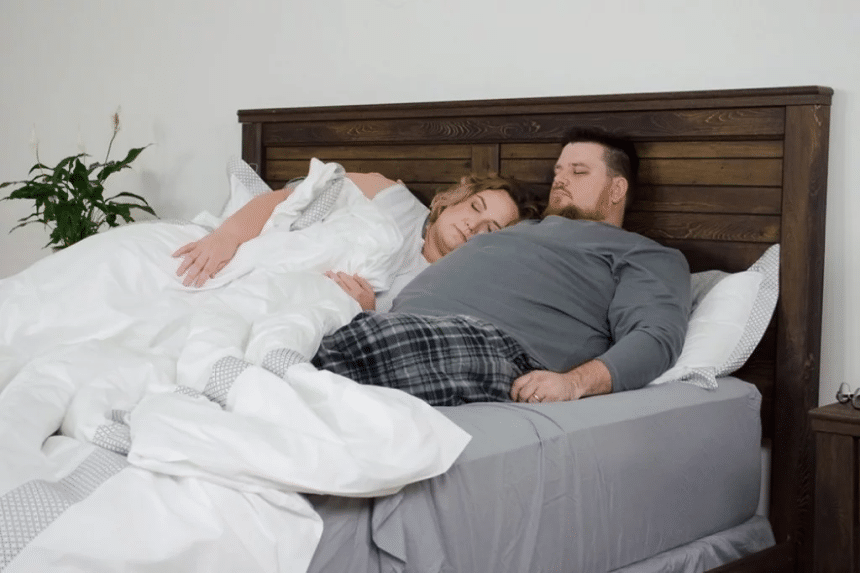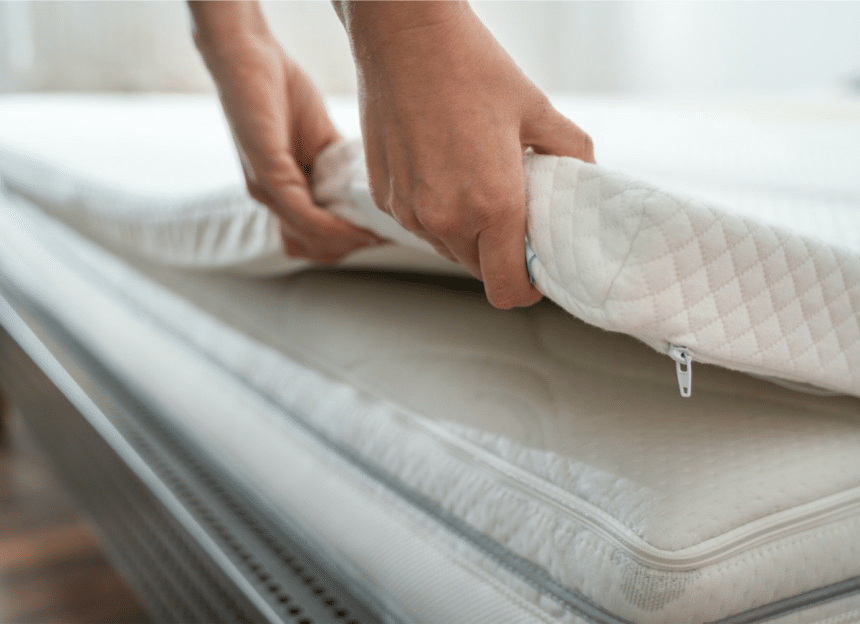How To Fix Sagging Bed Frame
Talk About Sleep is reader-supported. We may earn a commission through products purchased using links on this page. Learn more about our process here
Experts recommend that you replace the mattress after every 8 years, and according to The National Sleep Foundation, back pain and discomfort are among the signs that indicate that you are due for a new mattress. Sagging, which is inevitable over time, will cause similar symptoms as the indents deepen. A good mattress warranty will cover indentations, but only those of a particular size. For this reason, it is important to learn how to fix a sagging mattress to avoid discomfort and to extend its lifespan.
A high-quality mattress will cost you a substantial amount of money; so, it would be expensive to purchase a new one whenever sagging occurs. In this guide, we have explained affordable methods of how to fix a sagging mattress to improve sleep quality as well as the preventative measures you can adopt to limit tear and wear.
Steps to fix a sagging mattress with plywood:
 A quick and affordable remedy to fix a sagging mattress is by using plywood which you can easily get at your local store. Plywood is placed under the mattress to prop it up in areas that are developing indentation to ensure an even sleeping surface that will not cause pain from pressure points. Let's take a step-by-step guide on how to go about it.
A quick and affordable remedy to fix a sagging mattress is by using plywood which you can easily get at your local store. Plywood is placed under the mattress to prop it up in areas that are developing indentation to ensure an even sleeping surface that will not cause pain from pressure points. Let's take a step-by-step guide on how to go about it.
1. Determine the type of your mattress
Mattresses are made of materials that are as varied as the levels of support they provide and the foundations they are compatible with. Some mattresses are not compatible with adjustable bases while others only work with specific types of bed frames. For instance, plywood would not be a good solution for air mattresses, innerspring models or water beds.
Manufacturers usually offer guidance on approved foundations and the minimum slat distance for their products to prevent voiding the warranty for the type of mattress you own.
2. Measure the depth of dip
Once you have established that the mattress you have can be safely fixed with plywood, the next step is to take a ribbon and measure the depth of the sagging area so you can cut the plywood to match the size and shape of the indentation.
3. Choose plywood wisely
For sturdy support that will not buckle under the weight of your mattress, we recommend using thick plywood of at least 3/4 inches.
If the plywood is rough, use a sanding block to smoothen it before placement to prevent damage to your mattress.
4. Cut the wood according to your measurements
As you cut the plywood to a custom size, bear in mind that it should be large enough to cover and raise the sagging area to the same level as the rest of the mattress.
5. Place the mattress on the plywood
Place the plywood on the bed's foundation and position it where the sagging spot will be when you put back the mattress. Place the mattress on the plywood and lie on it to check whether the problematic section has been firmed up. If there is still indentation, increase support by adding more plywood in the same size you had cut in Step 4 until the surface of the mattress is even.
Benefits and drawbacks of plywood
 Plywood is a convenient way to fix a sagging mattress; it is cost-effective, easily available and quick to install for extra support.
Plywood is a convenient way to fix a sagging mattress; it is cost-effective, easily available and quick to install for extra support.
However, it only provides temporary reprieve since an old mattress will typically sag after a while despite the plywood. Plywood also provides a fertile environment for mildew to thrive under the mattress due to humidity and limited airflow as the mattress is placed flat on the plywood.
Why do mattresses sag, after all?
Almost all mattresses will sag at some point because there are several factors that contribute to it. Knowing the causes will help you to protect your mattress by reducing the extent of sagging so it can be easily fixed.
Your box spring is old
A box spring weakens as it ages, and this may cause your mattress to sag if there are broken parts which cannot provide adequate support. If you notice any damage on your spring box, you can replace the frame or utilize plywood underneath the mattress to prop up any sagging sections. As mentioned earlier, consider a sturdy bed base that is compatible with your mattress to reduce chances of sagging.
You sleep on one certain area
Some types of mattresses are better than others at retaining their shape for longer. Temperature-sensitive mattresses are resilient and can accommodate several sleeping sessions before they show any sign of sagging. This is because they respond to your body weight and temperature when you lie down and distribute your weight evenly across the mattress, and then resume their normal shape when you are off the mattress.
Depending on the type of mattress you own, it may develop indentations if you only sleep on one area of the mattress. If your body weight is not evenly distributed on the mattress, pressure points created around your hips and shoulders may accelerate sagging in those sections. In this case, rotating the mattress would help to even out such spots.
Poor maintenance
As with any other precious investment, good maintenance of your mattress will prolong its lifespan. Use approved bed frames, check for signs of sagging and fix it as soon as you can by using plywood to avoid further indentation and by rotating your mattress regularly.
Poor quality/old mattress
A high-quality mattress should provide you with adequate support and comfort for uninterrupted sleep devoid of numbness and pain on your lower back, neck and spine. Keep in mind the type of sleeping position you favor so you can choose a mattress with the right level of firmness.
You sleep on a certain area too often
Some individuals switch sleeping positions at night while others may adopt only one sleeping position such as side sleeping throughout the night.
When you sleep in one specific spot for a long period, the mattress layers in that area start deteriorating and develop indentation as they frequently contour to your body shape. This is why it is recommended to rotate your mattress after every 3 to 6 months to retain or restore its shape and to avoid uneven wear.
If you have a double-sided mattress, then you may flip it after every 6 months. Otherwise, most mattresses are one-sided with the two sides featuring different functions and construction materials; a top side sporting comfort layer specifically designed to serve as a sleeping surface and a bottom side fortified with sturdy high-density materials for foundational support.
Your weight
 As well as sleeping position, another factor to consider when choosing a mattress is the intended sleeper's body weight. Needless to say, heavy individuals require a firm mattress made of sturdy materials that can support their chest, hips, belly and pelvis to avoid excessive sinkage. Too much sinking which could cause sagging as the structural integrity of the mattress weakens can be avoided with a bed frame for heavy person.
As well as sleeping position, another factor to consider when choosing a mattress is the intended sleeper's body weight. Needless to say, heavy individuals require a firm mattress made of sturdy materials that can support their chest, hips, belly and pelvis to avoid excessive sinkage. Too much sinking which could cause sagging as the structural integrity of the mattress weakens can be avoided with a bed frame for heavy person.
Too much fun happening on it (if you know what we mean)
Sagging may occur if the mattress you share with your partner lacks bounce and responsiveness that allows it to absorb impact and restore its shape after the pressure exerted by your bodies during intimate activities.
Alternatives to plywood
Sometimes you can't use plywood for a sagging mattress. In this section, we will discuss other ways you can fix a bed frame.
Replace the bed base
Your foundation may be responsible for a sagging mattress if it is old, or there is too much distance between the slats, or if it is unsuitable for your particular mattress, in which case, you also risk voiding warranty.
A mattress topper
 An ideal mattress topper has to be dense to even out the sleeping surface so you don't feel any sagging, but it is a temporary measure. Instead of replacing your mattress, it would be much cheaper to buy Cooling Talalay Latex Mattress Topper which is of medium firmness with exceptional breathability and pressure relief.
An ideal mattress topper has to be dense to even out the sleeping surface so you don't feel any sagging, but it is a temporary measure. Instead of replacing your mattress, it would be much cheaper to buy Cooling Talalay Latex Mattress Topper which is of medium firmness with exceptional breathability and pressure relief.
Rotate the mattress
We have already explained the importance of rotating your mattress regularly and how often you should it to avoid premature sagging.
Pillows
Pillows may provide a quick short-term of fixing a sagging mattress, either by placing them under the mattress to level the sagging areas or by positioning them under your back or hips to relieve pressure points.
Warranty
A good warranty will provide coverage for indentations of a specified size. If the terms allow it, the manufacturer may have your mattress repaired or replaced.
Final thoughts
With all the tips we have provided, you should be able to fix a sagging mattress with plywood in simple steps, or utilize some of the other options we have included to prevent or fix sagging. Better still, investing in a good mattress such as Puffy memory foam mattress will promote restful, uninterrupted sleep and prevent premature sagging. The 5-layered mattress is compatible with any frame or surface and it comes with a lifetime warranty.
How To Fix Sagging Bed Frame
Source: https://www.talkaboutsleep.com/how-to-fix-a-sagging-mattress-with-plywood/
Posted by: ayalasafteph.blogspot.com

0 Response to "How To Fix Sagging Bed Frame"
Post a Comment